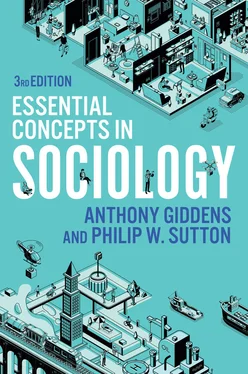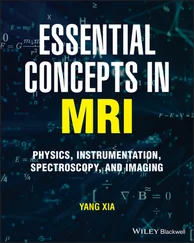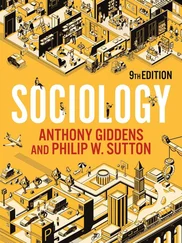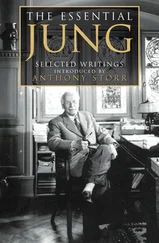Rostow, W. W. (1961) The Stages of Economic Growth (Cambridge: Cambridge University Press).
Wagner, P. (2012) Modernity: Understanding the Present (Cambridge: Polity).
Williams, R. (1987) Keywords: A Vocabulary of Culture and Society (London: Fontana).
Postcolonialism
Working Definition
A political and intellectual movement seeking to better understand the historical and continuing impact of colonial regimes on the world’s societies and the global production of knowledge. In sociology, postcolonial theorists seek to ‘decolonize’ the discipline, which remains dominated by Western scholars and institutions.
The development of sociology from its inception has been largely focused on the period of modernityas this emerged and developed in Western Europe and North America, later impacting on the rest of the world. Western modernization theory argued that all countries would develop economically, though at different rates and times. Marxist critics argued that ‘underdevelopment’ was a policy pursued by colonial regimes which systematically plundered resources and actively ‘underdeveloped’ the colonized regions and countries.
Since the 1980s, debates around the colonial period and its legacy have shifted from theories of economic underdevelopment to the broader concerns of postcolonialism. This is a growing intellectual movement that is highly critical of sociology’s Eurocentrism, theoretical sidelining of the significance of colonialism and a lack of scholarly voices from the Global South (Bhambra 2014a). Postcolonial ideas can be traced back to the early twentieth century, but the origins of the emerging postcolonial intellectual movement lie in the 1980s and 1990s.
Bhambra (2014b) argues that contemporary postcolonialism owes much to debates around the work of Homi Bhabha (1994) on alternative cultural traditions disrupting the Western narrative of modernity, Gayatri Spivak (1988) on the historical development of dominant discourses and Edward Said (1978) on power relations and knowledge production. Said’s (1978) work on the discourse of ‘orientalism’ is often cited as a foundational work of postcolonial theory.
Many Western academics in the nineteenth and early twentieth centuries discussed ‘the Orient’ or ‘the East’ in their studies of the Middle East, Africa and Asia, contrasting this with the Western Occident. Said argues that this contrast was hardly ever drawn in a neutral way. Instead, the Orient was exoticized and presented as the ‘other’ set against the normal and superior (Western) Occident. The persistence of this discourse was facilitated by the exclusion of scholarly accounts from academics based outside the West. Hence, the apparent cultural differences between East and West came to be seen as a key part of the explanation for Western global economic, industrial and military dominance. In sum, orientalism played a crucial ideological role in legitimizing many brutal colonial regimes.
Meaning and Interpretation
The state policy of colonialism, adopted by Western states between the seventeenth and mid-twentieth century, had profound consequences for global development that continued long after colonies regained their independence. Some, such as Haiti and former Spanish colonies in South America, became independent countries in the early nineteenth century. Others, including India, Malaysia, Singapore, Kenya, Nigeria and Algeria, achieved independence much later, some well into the second half of the twentieth century. But the impact of colonialism left newly independent countries with severe economic disadvantage and political problems.
Postcolonial theorists argue that the damaging, wide-ranging and long-lasting impacts of colonialism are not routinely embedded within or even acknowledged by conventional sociological theories. Colonialism was not a time-limited episode that sociological theories of contemporary life can ignore, but was a crucial factor in shaping the world’s power relations and continues to blight former colonies today. Unless sociologists acknowledge this, then their accounts of global inequality and globalization processes, for example, will not be valid.
Connell (2018) argues that European sociology developed with very little, if any, input from Global South scholars, which generated a Eurocentric and partial standpoint rooted in the experience of the Global North. This is one reason why the discipline’s founders, its main theoretical perspectives and empirical research base have long reflected the situation in the more powerful nation states. Postcolonial scholars argue that we need a thoroughgoing ‘decolonization’, not just of sociology but of all academic disciplines.
Postcolonial theorists also seek to introduce the past and present work of scholars based in the Global South into sociology to broaden its worldview. For example, Go (2016) argues for a ‘Southern standpoint’ strategy for sociology, which means doing ‘social science from below’, focusing on the experiences, concerns and categories of those at the bottom of the global hierarchy. In the process, existing Eurocentric theories and concepts will be tested and assessed. Eurocentric sociology tells us a lot about life in the privileged, relatively wealthy countries of the world but arguably fails to relate this in a systematic way to the active underdevelopment of former colonies and their post-independence experiences. Postcolonial scholars try to find ways of addressing such issues.
The charge that sociology has generally and quite routinely downplayed, ignored or just not fully understood the devastating consequences of colonialism is persuasive and seems to be accepted by a growing number of the younger generation of sociologists. Yet there is less agreement on what should and could be done to rectify this. Some argue for a rethinking of sociology from the ground up, as it were, while others argue for a genuinely global sociology that would maintain existing perspectives and theories, while also engaging more systematically with scholars based in the Global South.
In sociology’s defence, it can be noted that sociologists have always been interested in global inequalities, comparative development, nationalism, global politics and international conflict, which demonstrates that the discipline is perhaps not as insular as it is sometimes portrayed. Similarly, sociology is often seen as a discipline that is so open to ideas and theories from outside its existing disciplinary boundaries as to hinder its acceptance as a ‘scientific’ subject. Finally, McLennan has argued that it is unrealistic to imagine that any academic enterprise could escape its material and institutional location, and sociology is no different. He argues that ‘all thought systems are inevitably ethnocentric in focus, style and available expertise. Moreover, what it even means to “decolonize” or to “postcolonialize” sociology is far from crystal clear’ (McLennan 2010: 119).
Unlike many other concepts in this book, the ‘postcolonial turn’ (Olukoshi and Nyamnjoh 2011) is relatively recent and is still developing in sociology. As a result, it is too early to say with any certainty exactly how the engagement between sociology and postcolonialism will develop. What is clear is that the postcolonial intervention has disrupted ‘business as usual’ and that there are many insightful studies emerging from within this perspective, particularly on what ‘decolonizing sociology’ might actually require.
Читать дальше












